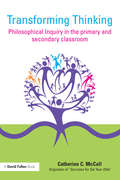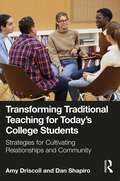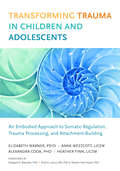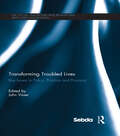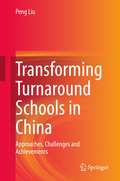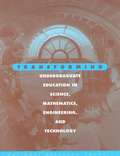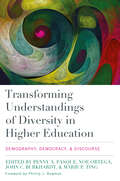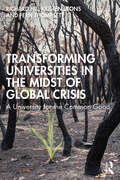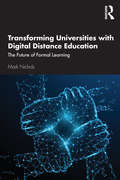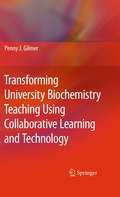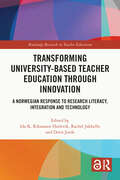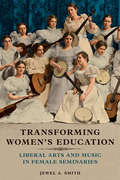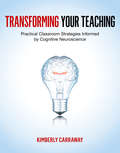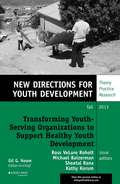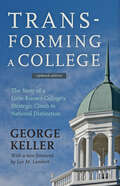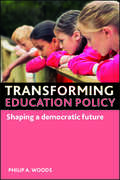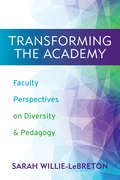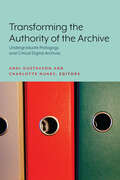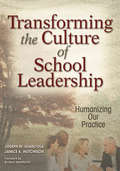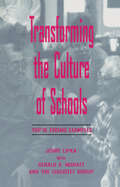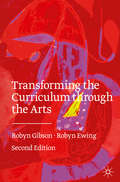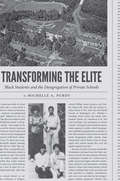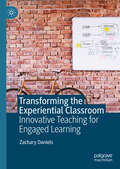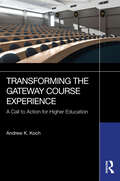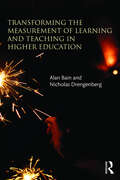- Table View
- List View
Transforming Thinking: Philosophical Inquiry in the Primary and Secondary Classroom
by Catherine C. McCallEssential reading for anyone who seeks to prepare active citizens for the twenty-first century, this long-awaited book considers Philosophical Inquiry, an empowering teaching method that can lead to significant improvements in confidence and articulacy, and produce positive effects in other school activities and in interactions in the wider world. Readers are guided through the creation of a Community of Philosophical Inquiry (CoPI) in the kindergarten, the classrooms of primary and secondary schools, the community centre and beyond, with practical ideas to make CoPI work. With examples ranging from five year old children to underachieving teenagers, and even senior citizens, the book shows how participation in a CoPI develops: the skills of reasoning, critical and creative thinking concept formation and judgment the virtues of intellectual honesty and bravery. Including chapters on the theory and development of Philosophical Inquiry, the creation of a community, and using CoPI with groups of different ages, this book forms essential reading for teachers, professionals and community workers.
Transforming Traditional Teaching for Today's College Students: Strategies for Cultivating Relationships and Community
by Dan Shapiro Amy DriscollBy giving students a greater voice in how their learning is facilitated, this book offers a fresh spin on classic college teaching methods.Seasoned faculty developers Driscoll and Shapiro cover seven common teaching approaches and how they can be leveraged to support the development of students as co-teachers. The easily digestible, practical strategies throughout each chapter pair powerfully with candid case studies. Readers are able to witness firsthand the uncertainties, disappointments, and successes of the post-pandemic classroom as faculty and students work together to overcome challenges and form deep connections. While an indispensable resource for those new to teaching, this book also serves as an innovative tool for experienced instructors and educational developers alike, imparting guidance that will result in more meaningful interactions, stronger relationships, and a genuine sense of community in the college classroom.
Transforming Trauma in Children and Adolescents: An Embodied Approach to Somatic Regulation, Trauma Processing, and Attachment-Building
by Elizabeth Warner Alexandra Cook Heather Finn Anne WescottAn innovative somatic and attachment-based treatment for working with children and adolescents who suffer from complex trauma and neglectThe SMART (Sensory Motor Arousal Regulation Treatment) program addresses three key processes that can be derailed by developmental trauma--somatic regulation, trauma processing, and attachment-building--and uses movement and sensation to target the neurological structures that support emotional and behavioral regulation. Transforming Trauma in Children and Adolescents teaches therapists the eight key skills required for SMART mastery and provides seven regulation tools for clients, helping children and adolescents manage their feelings and attend to developmental tasks like making friends, participating at school, learning to play with others, and developing a sense of self that includes--but isn't defined by--the trauma they've experienced. Enriched with case studies and recommended adaptations, the book includes resources for parents and other caregivers who want to provide ongoing supportive care outside the clinical setting.
Transforming Troubled Lives: Key Issues in Policy, Practice and Provision (International Perspectives On Inclusive Education Ser.)
by John VisserAll cultures have children and young people whose emotional wellbeing requires attention and whose behaviours give them, their peers and those who care for them challenges in how to meet their needs. Developing good practice across work with children and young people with social, emotional and behavioural difficulties relies on both professional practice and theory. The chapters in this book are taken from those presented at the International Conference organised by SEBDA in 2010 around the theme ‘Transforming Troubled Lives’, with each contributor addressing issues of policy, practice or provision whilst exploring an essential question: is what we are doing effective? This critical reflective question is essential if interventions – be they in provision, policy or practice – are to lead to positive outcomes for the children and young people concerned.This book was originally published as a special issue of Emotional and Behavioural Difficulties.
Transforming Turnaround Schools in China: Approaches, Challenges and Achievements
by Peng LiuThis book provides a holistic picture of how Chinese turnaround schools have been remarkably improved over the years and to arouse further discussion in this regard. It contributes to the understanding of school improvement from a Chinese cultural perspective, solidifies the knowledge basis of school change theories, and expands the understanding of educational administration and policies in China.
Transforming Undergraduate Education in Science, Mathematics, Engineering, and Technology
by National Research CouncilToday's undergraduate students--future leaders, policymakers, teachers, and citizens, as well as scientists and engineers--will need to make important decisions based on their understanding of scientific and technological concepts. However, many undergraduates in the United States do not study science, mathematics, engineering, or technology (SME&T) for more than one year, if at all. Additionally, many of the SME&T courses that students take are focused on one discipline and often do not give students an understanding about how disciplines are interconnected or relevant to students' lives and society.To address these issues, the National Research Council convened a series of symposia and forums of representatives from SME&T educational and industrial communities. Those discussions contributed to this book, which provides six vision statements and recommendations for how to improve SME&T education for all undergraduates.The book addresses pre-college preparation for students in SME&T and the joint roles and responsibilities of faculty and administrators in arts and sciences and in schools of education to better educate teachers of K-12 mathematics, science, and technology. It suggests how colleges can improve and evaluate lower-division undergraduate courses for all students, strengthen institutional infrastructures to encourage quality teaching, and better prepare graduate students who will become future SME&T faculty.
Transforming Understandings of Diversity in Higher Education: Demography, Democracy, and Discourse
by John C. Burkhardt Penny A. Pasque Noe Ortega Marie P. TingThis exciting new text examines one of the most important and yet elusive terms in higher education and society: What do we mean when we talk in a serious way about “diversity”? A distinguished group of diversity scholars explore the latest discourse on diversity and how it is reflected in research and practice. The chapters trace how the discourse on diversity is newly shaped after many of the 20th century concepts of race, ethnicity, gender and class have lost authority. In the academic disciplines and in public discourse, perspectives about diversity have been rapidly shifting in recent years. This is especially true in the United States where demographic changes and political attitudes have prompted new observations—some which will clash with traditional frameworks.This text brings together scholars whose research has opened up new ways to understand the complexities of diversity in higher education. Because the essential topic under consideration is changing so quickly, the editors of this volume also have asked the contributors to reflect on the paths their own scholarship has taken in their careers, and to see how they would relate their current conceptualization of diversity to one or more of three identified themes (demography, democracy and discourse). Each chapter ends with a candid graduate student interview of the author that provides an engaged picture of how the authors wrestle with one of the most complicated topics shaping them (and all of us) as individuals and as scholars. Of interest to anyone who is following the debates about diversity issues on our campuses, the book also offers a wonderful introduction to graduate students entering a discipline where critically important ideas are still very much alive for discussion.
Transforming Universities in the Midst of Global Crisis: A University for the Common Good
by Kristen Lyons Richard Hil Fern ThompsettThis book calls into question the colonial and neoliberal university, presenting alternative models of higher education that can more effectively respond to today’s intersecting social, economic, environmental and political crises. The authors argue that universities should be driven by a different set of core values – one that promotes the common good over private or commercial interests, individualism and market fundamentalism. Presenting a broad range of educational initiatives from around the world that reflect life-affirming regenerative and relational practices, Indigenous intellectual sovereignty, and principles of social and ecological justice, the authors contend that pathways toward transforming higher education already exist within and without the university. This task, say the authors, is urgent and necessary if universities and other institutions are to hold relevance in a rapidly changing global environment. This book makes a unique contribution to critiques of the modern, neoliberal university by looking for alternatives within and beyond traditional institutions of higher education. In doing so, the authors dismantle the longstanding 'ivory tower' image of the university, instead resituating education within broader social and ecological communities. Transforming Universities in the Midst of Global Crisis is aimed at all those who have a direct or indirect interest and stake in universities, from the general reader to futurists, ecologists as well as students, academics, administrators, managers, policy makers and politicians.
Transforming Universities with Digital Distance Education: The Future of Formal Learning
by Mark NicholsTransforming Universities with Digital Distance Education explores the ways in which higher education stakeholders can apply and leverage the benefits of online learning. Systems-wide access, scale and quality are achievable goals but require forms of teamwork and financial modelling beyond those at the instructor or programme level. This book’s organisational view tackles the systems and practices that will help senior managers and decision-makers guide an entire institution away from dysfunction—incremental progress, insufficient capacity, high costs and generic products—and towards the macro-level implementation and operations of effective online pedagogies.
Transforming University Biochemistry Teaching Using Collaborative Learning and Technology
by Penny J. GilmerOne aim of Gilmer's captivating text on university pedagogy is to show that biochemistry (or any science) does not consist solely of facts to be learned, but is a way of thinking about the world. Her purpose, both in this book and in her classroom, is to make her students into critical thinkers rather than passive learners. The chapters cast a critical eye over research into enhanced education techniques such as collaborative learning. Gilmer describes the action research she conducted in her own biochemistry undergraduate classroom into ways of improving the learning environment. She offers various perspectives on the make-up of her classroom, including an analysis of ethnographic data. The tools Gilmer employs as she hones her teaching skills include collaborative learning and technology. She views the classroom through various theoretical perspectives: social constructivism, cultural-historical activity theory, and a theory that involves the dialectic between the structure of the learning environment and the agency of the learners (a group among whom she includes herself). She provides a wealth of autobiographical detail as well as the results of her action research, which followed up on its original subjects after an interval of 11 years, to see what impact her course had on their professional growth. Above all, this volume is proof of what can be achieved in education when teachers are as interested in the process of learning as they are in their subject itself.
Transforming University-based Teacher Education through Innovation: A Norwegian Response to Research Literacy, Integration and Technology (Routledge Research in Teacher Education)
by Doris Jorde Rachel Jakhelln Ida K. Riksaasen HatlevikThis Norwegian-led, internationally relevant edited collection provides new insights into the transformation of teacher education programmes of the future by collating novel and cutting-edge innovations gleaned from ProTed, the Centre for Professional Learning in Teacher Education in Norway.Presenting research findings from a 10-year funded period of innovation and practice, the book discusses the implementation and dissemination of successful innovations to other teacher education institutions, both national and international. Led by direct experiences combined with empirical results, chapters explore a variety of methods that promote best practice within universities and higher education programmes. These include the progression and coherence in programme design, the relationship and partnerships between university campus and schools, teachers’ professional identities and communities, integrated teacher education, and the advantages of using video technology in teaching practice for a digital future.Ultimately serving as a useful tool for research-based knowledge to inform policy development, this book will be of interest to researchers, scholars, and postgraduate students in teacher education, higher education, and teacher reform more broadly. Those interested in research design will also find the book useful.
Transforming Women's Education: Liberal Arts and Music in Female Seminaries (Music in American Life)
by Jewel A. SmithFemale seminaries in nineteenth-century America offered middle-class women the rare privilege of training in music and the liberal arts. A music background in particular provided the foundation for a teaching career, one of the few paths open to women. Jewel A. Smith opens the doors of four female seminaries, revealing a milieu where rigorous training focused on music as an artistic pursuit rather than a social skill. Drawing on previously untapped archives, Smith charts women's musical experiences and training as well as the curricula and instruction available to them, the repertoire they mastered, and the philosophies undergirding their education. She also examines the complex tensions between the ideals of a young democracy and a deeply gendered system of education and professional advancement. An in-depth study of female seminaries as major institutions of learning, Transforming Women's Education illuminates how musical training added to women's lives and how their artistic acumen contributed to American society.
Transforming Your Teaching: Practical Classroom Strategies Informed by Cognitive Neuroscience
by Kimberly CarrawaySuccessful teaching techniques informed by the latest research about how kids' brains work. Teachers are forever searching for ways to help students raise test scores or improve memory and organizational skills. Brain research is finally beginning to show them how they can shape their daily teaching practices to best meet these kinds of needs, and more, in their students. But how is a teacher to make sense of all the studies, research reports, and papers? How can you know what will actually work in the classroom? In this book, Kimberly Carraway, a leading educator and "teacher of teachers," not only summarizes the most essential principles of how the brain learns, but also unpacks hundreds of ready-to-use applications of research in the classroom, translating the science into teaching strategies and learning activities that optimize student outcomes. Transforming Your Teaching is not about doing more. It's about doing things more effectively. With brain-based tips for instructional design, knowledge assessment, and the enhancement of learning skills like time management, note-taking, attention, reading comprehension, organization, and memory, this user-friendly book will empower teachers, administrators, and parents to maximize retention and classroom success for their K-12 students.
Transforming Youth Serving Organizations to Support Healthy Youth Development: New Directions for Youth Development, Number 139 (J-B MHS Single Issue Mental Health Services)
by Kathy Korum Sheetal Rana Ross VeLure Roholt Michael BaizermanThis volume tells the story of major organizational change efforts at one municipal youth-serving organization to better support healthy youth development system wide. Presenting the viewpoints of young people, frontline staff, supervisors, managers, and the director, it reviews how the organization developed and transformed. Each article then describes the different strategies and tactics used to support organizational transformation. Learn: How a youth work professional development strategy ended up as an organizational development and change strategy How the partnership with a university expanded to include community-based research and evaluation to support youth program development and improvement within the organization. How youth advice structures can support high-quality youth programming and, by extension, improvements in organizational supports for quality youth programs How partnerships with other organizations supported ongoing adaptation of the organization to better address youth needs This is the 139th volume of New Directions for Youth Development, the Jossey-Bass quarterly report series dedicated to bringing together everyone concerned with helping young people, including scholars, practitioners, and people from different disciplines and professions.
Transforming a College: The Story of a Little-Known College's Strategic Climb to National Distinction
by George KellerGeorge Keller’s case study of Elon University’s transformation from a struggling college with a limited endowment into a top regional university is now available in paperback.Ten years after the publication of Transforming a College, Elon University continues to thrive as a school that reinvented itself and its community around the idea of inspiring and guiding students. George Keller’s now-classic account has been used as an inspiration and playbook for many other institutions. Available for the first time in paperback, this edition coincides with Elon’s 125th anniversary. A new foreword and afterword from Elon president Leo M. Lambert tell the rest of the story of the university’s ambitious agenda to position Elon as a top-ranked liberal arts university and a national leader in engaged teaching and learning.
Transforming education policy: Shaping a democratic future
by Philip A. WoodsEducation is in a state of continual change and schools ever more diverse. People want more participation and meaning in their lives; organisations want more creativity and flexibility. Building on these trends, this timely book argues that a new paradigm is emerging in education, sowing the seeds of a self-organising system that values holistic democracy. It is an essential read for anyone (academics, policy-makers, practitioners, students, parents, school sponsors and partners) who is interested in how education can broaden its horizons.
Transforming the Academy: Faculty Perspectives on Diversity and Pedagogy
by Daphne Lamothe Michael D. Smith Eve Tuck Dela Kusi-Appouh Kristin Lindgren Sarah Willie-Lebreton Theresa Tensuan Aurora Camacho de Schmidt Cheryl Jones-Walker Patrick Pato" Hebert H. Mark Ellis Betty Sasaki Anita Chikkatur Anna WardIn recent decades, American universities have begun to tout the "diversity" of their faculty and student bodies. But what kinds of diversity are being championed in their admissions and hiring practices, and what kinds are being neglected? Is diversity enough to solve the structural inequalities that plague our universities? And how might we articulate the value of diversity in the first place? Transforming the Academy begins to answer these questions by bringing together a mix of faculty--male and female, cisgender and queer, immigrant and native-born, tenured and contingent, white, black, multiracial, and other--from public and private universities across the United States. Whether describing contentious power dynamics within their classrooms or recounting protests that occurred on their campuses, the book's contributors offer bracingly honest inside accounts of both the conflicts and the learning experiences that can emerge from being a representative of diversity. The collection's authors are united by their commitment to an ideal of the American university as an inclusive and transformative space, one where students from all backgrounds can simultaneously feel intellectually challenged and personally supported. Yet Transforming the Academy also offers a wide range of perspectives on how to best achieve these goals, a diversity of opinion that is sure to inspire lively debate.
Transforming the Authority of the Archive: Undergraduate Pedagogy and Critical Digital Archives
by Andi GustavsonFeaturing a wide array of perspectives, Transforming the Authority of the Archive details new roles for archives in undergraduate pedagogy and new roles for undergraduates in archives. While there has long been a place for archival exploration in undergraduate education (especially primary source analysis of items curated by archivists and educators), the models offered here engage students not only in analyzing collections, but also in the manifold challenges of building, stewarding, and communicating about collections. In transforming what archives are to undergraduate education, the projects detailed in this book transform the authority of the archive, as students and community partners claim powers to curate and create history. Contributions to this volume represent a range of institutions including small liberal arts colleges, HBCUs, Ivy Leagues, large research institutions, and community-based collections. The assignments, projects, and initiatives described across this volume are fundamentally concerned with the challenge to model digital archival collections so as to center individual and community voices that are historically under-engaged in the archives. To address this challenge, contributors describe various approaches to substantively, often radically, redistribute archival resources and authority. The chapters within Transforming the Authority of the Archive offer thoughtful and creative pedagogical approaches to counter the presumed neutrality of the archive and advocate a shared understanding of the contingency of archival collections. This book is a must-read for liberal arts faculty, graduate students, archivists (both community- and institutionally-affiliated), information-studies professionals, librarians, and other professionals working and teaching in archives, museums, libraries, and other cultural heritage institutions.
Transforming the Culture of School Leadership: Humanizing Our Practice
by Dr Joseph M. Giancola Janice HutchisonEffective leaders and organizations blossom in productive climates. Personal transformation, one person at a time is the key to building a team of empowered educators.
Transforming the Culture of Schools: Yup¡k Eskimo Examples (Sociocultural, Political, and Historical Studies in Education)
by Jerry Lipka With Gerald Mohatt Esther IlutsikThis book speaks directly to issues of equity and school transformation, and shows how one indigenous minority teachers' group engaged in a process of transforming schooling in their community. Documented in one small locale far-removed from mainstream America, the personal narratives by Yupík Eskimo teachers address the very heart of school reform. The teachers' struggles portray the first in a series of steps through which a group of Yupík teachers and university colleagues began a slow process of reconciling cultural differences and conflict between the culture of the school and the culture of the community.The story told in this book goes well beyond documenting individual narratives, by providing examples and insights for others who are involved in creating culturally responsive education that fundamentally changes the role and relationship of teachers and community to schooling.
Transforming the Curriculum Through the Arts
by Robyn Ewing Robyn GibsonThis textbook highlights the unique role that quality Arts processes and experiences can and should play across the curriculum to ensure that all learners’ creativities and imaginations flourish. It provides much-needed strategies, units of work and practical resources in six arts disciplines – visual arts, literature, drama, music, dance and media arts. It is a must-read for those keen to develop research-informed, integrated, arts-rich learning and teaching strategies while also exploring each discipline. Alongside the ‘four Cs’ (critical thinking, communication, collaboration and creativity) the authors propose four additional ‘Cs’: curiosity, compassion, connection and courage as much-needed 21st century capabilities. The book speaks to the current debates on STEAM vs. STEM education, and provides an important framework for preservice and experienced classroom teachers, including arts specialists.
Transforming the Elite: Black Students and the Desegregation of Private Schools
by Michelle A. PurdyWhen traditionally white public schools in the South became sites of massive resistance in the wake of the Supreme Court's Brown v. Board of Education decision, numerous white students exited the public system altogether, with parents choosing homeschooling or private segregationist academies. But some historically white elite private schools opted to desegregate. The black students that attended these schools courageously navigated institutional and interpersonal racism but ultimately emerged as upwardly mobile leaders. Transforming the Elite tells this story. Focusing on the experiences of the first black students to desegregate Atlanta's well-known The Westminster Schools and national efforts to diversify private schools, Michelle A. Purdy combines social history with policy analysis in a dynamic narrative that expertly re-creates this overlooked history. Through gripping oral histories and rich archival research, this book showcases educational changes for black southerners during the civil rights movement including the political tensions confronted, struggles faced, and school cultures transformed during private school desegregation. This history foreshadows contemporary complexities at the heart of the black community's mixed feelings about charter schools, school choice, and education reform.
Transforming the Experiential Classroom: Innovative Teaching for Engaged Learning
by Zachary DanielsThis book offers a groundbreaking resource designed to transform how experiential learning is integrated into educational settings across various disciplines. It offers a comprehensive resource for educators and practitioners who are committed to enhancing student engagement and learning outcomes through innovative, practical approaches. The book&’s distinctiveness lies in its interdisciplinary breadth, practical applicability, and strong focus on the development of both educators and students.
Transforming the Gateway Course Experience: A Call to Action for Higher Education
by Andrew K. KochServing as a call to action for educators to recognize and address inequities in gateway courses, this book offers an evidence-based model for improving teaching, learning, and student success within the foundational college classroom.Gateway courses often reflect broader societal, cultural, and economic issues; this book argues that inequitable outcomes result from specific practices and policies, rather than occurring naturally. Using data and examples from his work with various colleges and universities, Andrew K. Koch highlights the systemic issues that perpetuate inequality in higher education. He examines how and why race and class divisions are reinforced through current practice and the impact that these courses have on students’ sense of belonging. By giving suggestions for policy changes on how to combat high failure rates and challenging myths such as grade inflation and curve grading, this text seeks to critique and ultimately dismantle the toxic culture of “weeding out” students.This accessible book is for any college instructor who wants to transform gateway courses into true opportunities for student success, ultimately advancing higher education's broader equity and social justice goals.
Transforming the Measurement of Learning and Teaching in Higher Education
by Alan Bain Nicholas DrengenbergTransforming the Measurement of Learning and Teaching in Higher Education proposes a dynamic new model for educational measurement by reconceptualizing the field of learning analytics. Revolving around the agency and daily work of those in the field, this book describes how colleges and universities can be better structured for quality learning, showcases new tools for gathering emergent feedback, and demonstrates how that feedback can be used effectively across higher education organizations. Leaders and practitioners at all levels are offered new approaches for organizational and technological design that ensure the type of data and the way it is gathered serve the ultimate goal of high quality learning and teaching.
